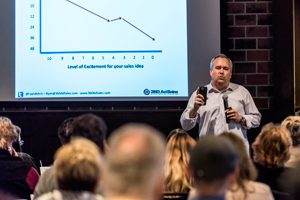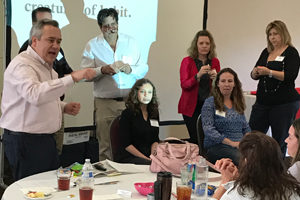10 Sales Tips to Help You Leave 2020 in the Dust
10 Sales Tips to Help You Leave 2020 in the Dust
2020 has been an absolutely c-r-a-z-y year, one we’ll never forget. But now it’s time to jump into 2021 and ramp up for a MUCH better year—a year that’s filled with some crazy success!
The question is, what are we going to do to dive into 2021 with a fervor? And how can we do more with less? (Because I’m sure we’re all being tasked to do just that.)
So I’m going to share with you some ideas that can help all of us drive toward serious success in 2021. When it comes down to it, these are fundamental things that we need to do consistently every year—in sales, in marketing, and in business—to truly become and to stay exceedingly successful.
These suggestions go way beyond the standard New Year’s resolutions people make. Because did you know that 75% of people just like you and me fail on those resolutions by January 28? They don’t even keep those resolutions alive more than 28 days!
Why? It’s because they don’t do these 10 things to set themselves up for success—success that lasts all year long and takes them into the next.
No 1: Set keystone habits first.
Most people go straight to goal setting, when they really need to set keystone habits first. What are they? They are far more important than the big sales goals you will set for 2021.
But what is a keystone? If you look at an arch in a doorway, picture an old castle if you will, there’s a prominent stone right in the center that looks like a wedge. And without that stone, called the “keystone,” the arch would fall. The strength of that arch comes from the keystone right in the center. It’s that foundational piece of an arch that’s going to last hundreds, if not thousands, of years.
What are keystone habits for you and me? Simple things, like getting plenty of sleep. Drinking plenty of water. Reducing stress by getting out and exercising. Things like that.
Think about it this way. Is weight loss a keystone habit? The answer is probably not. But a keystone habit to help you reach that larger goal might be, when you’re at the grocery store, to only shop from the outside aisles of the store, and not in the middle where the less healthy stuff is. Right?
Keystone habits are fundamental. What do they look like for you? The biggest one for me is sleep—making sure I get at least eight hours each night. And it’s tough, because I love to binge watch Netflix after a long day of work.
So think about your keystone habits … they’re going to be different from your big goals, but they’re going to set you up for success so you can reach the big ones.
No. 2: As you’re setting goals, identify the “why” in the goal.
Before you think about how you’ll get to your sales goals you’ve got to think about why. The why is fundamentally important to your success in goal setting in 2021.
Going back to the weight loss example, what would the “why” look like? Why are you trying to lose weight? To be healthier. But why? To live longer. But really, why? So that you don’t die! And you can actually enjoy the fruits of your labor.
So idea no. 2 gets down to the heart of the matter—and making sure you identify the “why” in every goal that you set. Not just the what, not just the how, but the why.
No. 3: Set mini goals to get to your bigger goals.
See, a lot of times the reason you fail on the big goals is because the mini goals have not been set or achieved. And there’s typically three mini goals below each main goal. And when you actually achieve your mini goals, that allows you to get to your big goal.
So let’s say, for example, that your big goal is to exceed your sales numbers in 2021. Excellent. Now what are the mini goals to get you there?
One mini goal might be to establish an active pipeline that you’re working every three days. And perhaps that could start with even another mini goal—like learning how to work your CRM really effectively.
Another mini goal in trying to get to the bigger goal could be that you’re going to learn your sales math, your call-to-close ratios, and then improve upon them.
To sum up: mini goals … set them to get to your bigger goals. And before that? Establish your keystone habits, and then sit down and identify the “why” in your bigger goals.
No. 4: Become a time management master.
Heading into 2021, we’re all being tasked to do more with less. So, being a time management master comes down, in my sales experience, to time blocking. You’ve absolutely got to learn to time block.
Let’s say one of your mini goals is, “I need to call 25 people each and every day.” How will you reach this? Time blocking. Put it on your calendar and make it repeat each day.
Time blocking is fundamentally one of the greatest things I’ve ever done that’s made the most impact on my sales life, my marketing life … even my personal life.
No. 5: Plan to adjust your plan.
Planning to adjust your plan is part and parcel to your success, because a lot of times we fail at goals simply because the train came off the tracks as we were trying to get to the goal. And when that happened, we simply didn’t know what to do.
So, plan to adjust your plan. Just plan to fail. “WHAT?” you’re saying. The gurus (be careful about self-proclaimed gurus) always say, “You’ve got to visualize winning. Visualize reaching your goals.”
But here’s what I tell people to think about in my sales training. Plan to fail so that you have a plan for when the train comes off the tracks—so you can get back on the tracks again, really fast. Planning to adjust your plan is really about understanding that the vast majority of people are going to fail on their way to getting to the big goal. So because of that, you want to plan to adjust your plan.
When the mini goal train goes off the tracks, how do you see that it’s going off the tracks and how do you get it back on? A lot of it, quite honestly, is simply paying attention.
No. 6: Oftentimes, you will need an accountability buddy.
Think about it. When do you lose the most weight? When you have a buddy. When do you gain the most muscle mass—on your own or with a trainer? Usually with a trainer. You probably need some kind of an accountability buddy.
Now, if you don’t have one, you can use your calendar, your phone, an app to constantly remind you. Whatever you use, an accountability buddy is vitally important in your sales life, your marketing life, and in your business life.
How do you find one? Maybe you pay for a coach. And that’s okay—I have a coach, and I think I’m pretty good at what I do, but I have a coach. And that coach is always asking me, “How are you doing on this? How are you doing on that?”
Having an accountability buddy, in whatever form that takes for you, is very, very important.
No. 7: Know your deal count.
In the sales business, if you’re going to achieve your sales goals, you’ve got to know your deal counts. You’ve got to know your call-to-close ratios.
It’s so difficult to go into a month of selling if you don’t know how many calls you need to make to get a meeting. And then, how many meetings do you need to have to close a deal? And how many deals do you need to get to goal?
To be successful in the sales business, you’ve got to know your numbers so you know what it takes for you to close a deal. I stress this over and over in my sales training.
Here’s an example. I know that if I call 10 people and I work them every three days, out of those 10 people I’m going to get a couple of meetings. Then, out of those meetings, usually about half of them, I’m going to get a proposal in front of that person. And from there, about 30% of the time I’m going to close.
So, when I get to 10 meetings, I close about three in 10. And I think that’s very, very successful.
But I was talking to a guy the other day and he said, “Ryan, I close 80% of meetings I go on. So I need help closing that last 20%.” And I’m like, “Dude, you need to write a book, because nobody closes 80% (without discounting).”
So, know your deal count. I truly believe that if you’re closing 30-40%, you’re doing well out there in COVID land.
No. 8: Recognize randomness when it occurs, and get rid of it.
Randomness kills your day. Randomness kills your goals. Randomness will kill your love life. Randomness will kill your personal life.
Randomness does not help you win.
So how do you recognize it and how do you get rid of it? First, it’s very simple. Look for things that work and repeat them. And then look for things that don’t work, and don’t repeat them.
I know it sounds so simple, but people just don’t pay attention. Recognize things that work and repeat those things. Recognize things that are not working and stop doing them.
It’s amazing to me the number of people that do the wrong thing in the sales business, in the marketing business, and in business in general. And they just keep doing it. I believe they think to themselves, “If I just work harder it’s going to work out.”
And I know where this comes from. It comes from having really great parents, grandparents, or somebody who raised you say, “If you work hard enough, you can achieve anything.”
Well, there’s some truth in that. I’m not trying to diminish what your parents or grandma said to you, but recognize, friends: When things aren’t working, stop doing the things that don’t work.
Conversely, when things are working, repeat the things that do work. Pay attention to them. Because these are the things that will make you successful.
No. 9: Set rewards for yourself if you need them.
Maybe your rewards look something like this, “I’m going to do this, and then if this is the end result I get a spa day for myself,” or, maybe for you it’s an expensive bottle of bourbon. Whatever that looks like for you, set rewards for yourself if you need them.
No. 10: Work your plan.
In my sales training, I encourage people to have a whiteboard in their offices. And I encourage them to write down their mini goals and their goals, and then to track themselves. The reason is, you’ve got to work your plan.
What’s your plan? Work it. If you’re not working your plan, nobody else is going to work it for you.
To recap, the 10 strategies I’ve outlined here start with setting keystone habits first. These habits are foundational and vitally important. No. 2, identify the “why” in your goal: why are you setting this goal? Why is it important to you, to your family, to your business? No 3, set mini goals—you’ve got to set at least three mini goals, on average, to get to the bigger goal. No. 4, become a time management master by time blocking your day. In sales, every day we need to prospect, retain, and propose. So block out time for it. No. 5, you’re going to fail, so plan for it. And plan to adjust your plan. The train is going to come off the tracks and you’ll need to recognize it when it does, and then have a plan to get it back on the tracks quickly. No. 6, you may need an accountability buddy. If you don’t need one, maybe your calendar is enough. But you’re probably going to be more successful with a buddy. No 7, you’ve got to know your deal count. You have to know how much it takes for you to get to a meeting. How much it takes for you to close deals. Work that sales math to your advantage. No. 8, recognize randomness and get rid of it in your life. Be deliberate. No. 9, set rewards for yourself. If you need them, set them for yourself. Then, no. 10, you’ve got to work your plan.
There you have it. This is my roadmap for sales success. It’s not the proposal template. It’s not the email templates. It’s recognizing why I’m doing things, how I’m doing things, and setting goals for myself. And here’s the thing, friends. You can do it, too. And then we’ll both see the kind of success in 2021 that we want to see.
Remember, if sales was easy everybody would be doing it, and they’re not. So we’re either crazy or we’ve found a career that will feed our families for a lifetime.
###



